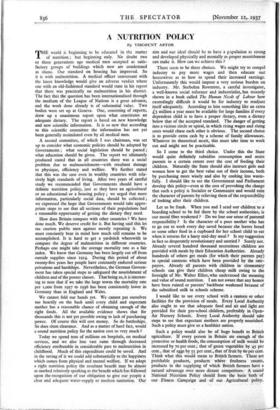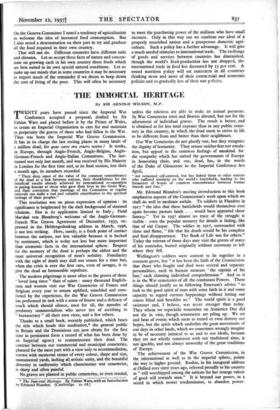A NUTRITION POLICY
By VISCOUNT ASTOR
THE world is beginning to be educated in the matter of nutrition ; but beginning only. No doubt two or three generations ago medical men accepted as satis- factory groups of buildings which now are condemned as slums. Our standard on housing has improved. So it is with malnutrition. A medical officer conversant with the latest knowledge would give an adverse verdict where one with an old-fashioned standard would state in his report that there was practically no malnutrition in his district. The fact that the question has been internationalised through the medium of the League of Nations is a great advance, and the work done already is of substantial value. Two bodies were set up at Geneva. One, consisting of experts, drew up a unanimous report upon what constitutes an adequate dietary. The report is based on new knowledge and new scientific information. It is so new that according to this scientific committee the information has not yet been generally assimilated even by all medical men.
A second committee, of which I was chairman, was set up to consider what economic policies should be adopted by Governments ; what social legislation should be passed ; what education should be given. The report we ultimately produced stated that in all countries there was a social problem due to malnourishment—with resultant damage to physique, efficiency and welfare. We further stated that this was the case even in wealthy countries with rela- tively high standards of living. After two years of careful study we recommended that Governments should have a definite nutrition policy, just as they have an agricultural or an educational or a housing policy ; we urged that more information, particularly social data, should be collected ; we expressed the hope that Governments would take appro- priate steps to see that all sections of their populations had a reasonable opportunity of getting the dietary they need.
How does Britain 'compare with other countries ? We have done much. We deserve credit for it. But having said this let me caution public men against merely repeating it. We must constantly bear in mind how much still remains to be accomplished. It is hard to get a yardstick wherewith to compare the degree of malnutrition in different countries. Perhaps one might take the average mortality rate as a fair index. We know that Germany has been largely cut off from outside supplies since 1914. During this period of about twenty-five years her people have constantly endured serious privations and hardships. Nevertheless, the German Govern- ment has taken special steps to safeguard the nourishment of children and of the poorer classes. That being so, it is interest- ing to note that if we take the large towns the mortality rate per 1,000 from 1927 to 1936 has been consistently lower in Germany than in England and Wales.
We cannot fold our hands yet. We cannot pat ourselves too heartily on the back until every child and expectant mother has a reasonable chance of obtaining enough of the right foods. All the available evidence shows that for thousands this is not yet possible owing to lack of purchasing power. Of course this will cost money. So do battleships.. So does slum clearance. And as a matter of hard fact, would a sound nutrition policy for the nation cost so very much ?
Today we spend tens of millions on hospitals, on medical services, and we also lose vast sums through decreased efficiency attributable in considerable part to malnutrition in childhood. Much of this expenditure could be saved. And in the saving of it we could add substantially to the happiness which comes from physical and mental welfare. If we adopt a right nutrition policy the resultant benefit may be almost as marked relatively speaking as the benefit which'has followed upon the recognition of our obligation to give our people a clear and adequate water-supply or modern sanitation. Our aim and our ideal should be to have a population as strong and developed physically and mentally as proper nourishment can make it. How can we achieve this ?
There seem to be three choices. We might try to compel industry to pay more wages and then educate our housewives as to how to spend their increased earnings. Unfortunately this would impose a very serious burden on industry. Mr. Seebohm Rowntree, a careful investigator, a well-known social reformer and industrialist, has recently shown in a book called The Human Needs of Labour how exceedingly difficult it would be for industry to readjust itself adequately. According to him something like an extra J5 million a year must be available for large families if every dependent child is to have a proper dietary, even a dietary below that of the accepted standard. The danger of getting into a vicious circle or spiral, in which rising wages and rising costs would chase each other is obvious. The second choice is to provide extra cash by a scheme of family allowances. Whatever its theoretical merit, this must take time to work out and might not be practicable.
So I come to the third choice. Under this the State would quite definitely subsidise consumption and assist parents to a certain extent over the cost of feeding their children. Naturally the State should also instruct girls and women how to get the best value out of their income, both by purchasing more wisely and also by cooking less waste- fully. I should like to see the Government and Parliament develop this policy—even at the cost of provoking the charge that such a policy is Socialist or Communist and would ruin the character of parents by relieving them of the responsibility of looking after their children.
Let us be frank. When you and I send our children to a boarding school to be fed there by the school authorities, is our moral fibre weakened ? Do we lose our sense of parental responsibility ? Is the character of a poor mother who has to go out to work every day saved because she leaves bread or some other food in a cupboard for her school child to eat when it returns for a hasty mid-day meal ? Is my suggestion in fact so desperately revolutionary and untried ? Surely not. Already several hundred thousand necessitous children are provided with meals by their Education Authorities. Already hundreds of others get meals (for which their parents pay) in special canteens which have been provided by the rate- payers. Already all parents with children in` elementary schools can give their children cheap milk owing to the foresight of Mr. Walter Elliot, who understood the meaning and value of sound nutrition. I am not aware that any homes have been ruined or parents' backbone weakened because of the subsidised milk in schools scheme.
I would like to see every school with a canteen or other facilities for the provision of meals. Every Local Authority also ought to see that adequate food and air and light are provided for their pre-school children, preferably in Open- Air Nursery Schools. Every Local Authority should take steps to see that expectant mothers are properly nourished. Such a policy must give us a healthier nation.
Such a policy would also be of huge benefit to British agriculture. If every person in Britain ate enough of the protective or health foods, the consumption of milk would be increased by 70 per cent., that of green vegetables by 45 per cent., that of eggs by 55 per cent., that of fruit by 6o per cent. Think what this would mean to British-farmers. These are perishable products, products ' where freshness counts, products in the supplying of which British farmers have a natural advantage over more distant competitors. - A sound National Nutrition Policy should form the basis both of our Fitness Campaign and of our Agricultural policy. On the Geneva Committee I noted a tendency of agriculturists to welcome the idea of increased food consumption. But I also noted a determination on their part to try and produce all the food required in their own country.
That will not do. Different countries have different soils and climates. Let us accept these facts of nature and concen- trate on growing each in his own country those foods which are best suited to its own special natural conditions. Let us make up our minds that in some countries it may be necessary to import much of the remainder if we desire to keep down the cost of living of the poor. This will often be necessary to meet the purchasing power of the millions who have small incomes. Only in this way can we combine our ideal of a properly nourished nation and a prosperous domestic agri- culture. Such a policy has a further advantage. It will give a much needed stimulus to international trade. The exchange of goods and services between countries has diminished. though the world's food-production has not dropped, the international trade in food has decreased by 15 per cent. A sound nutrition policy will set statesmen in all countries thinking more and more of their commercial and economic policies and so gradually less of their war policies.















































 Previous page
Previous page